| Strategy | Luck |
|---|---|
| Interaction | Components & Design |
| Complexity | Score |
Way too many religions in the world threaten their believers with going to a bad place if they misbehave. Let’s call it Hell. Or maybe Purgatory, if there’s a chance you might leave and go to a good place at some point. Think about that what you will. But in the Middle Ages, one religion went a step further than usual with this belief: the Catholic church offered their believers a way to buy themselves free from eternal punishment. With the purchase of a papal Indulgence, they advertised, your soul will go straight to heaven, all your sins forgiven. And as a side effect, the money will pay for a shiny new basilica in Rome. This practice was not universally popular. It was so unpopular, in fact, that a German priest and theologian rallied against it and caused a schism in the church that was never mended. And that’s why we get Mea Culpa, a game about indulgences, this year, exactly 500 years, after Martin Luther nailed his 95 Theses to the church door in Wittenberg.
To hell in a wheelbarrow – the rules
The goal in Mea Culpa is simple: To go to heaven. Or at least get closer to heaven than your opponents, because the road from Heaven to Hell is the victory point track. All players start in the middle of the track. There are many ways to go to Hell, but the only way to Heaven is through Indulgences. The main way to get Indulgences is, historically accurate, to make large donations to get cathedrals built. In a cynical twist, however, to make large contributions to the cathedrals you will sometimes commit sins and condemn your soul to hell – or, in game terms, you will lose victory points in various ways throughout the game, and when the game ends you’ll receive victory points for the indulgences you bought.
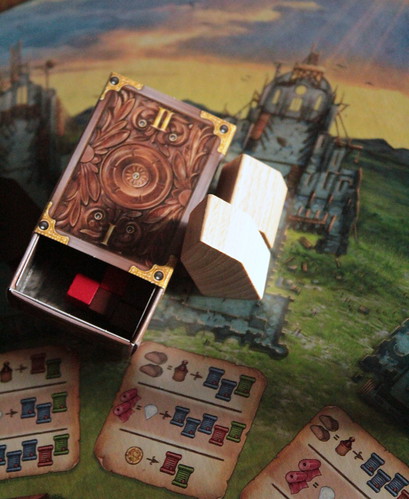
Let’s start from the end here. Mea Culpa ends when two of the three cathedrals on the board are built. For each cathedral, donors gain a number of Indulgences based on their donation. The two players who gave the most bread and wine will split some between them, so will the two players who donated the most cloth and gems, and so will the two players who donated the most money. Which category of donation is most valuable differs from cathedral to cathedral. Money is the most valuable donation on the left cathedral, on the middle one it’s close to worthless. And this, as they say, is where things get tricky.
When you put donations in your personal donation box you don’t donate to the left, central or right cathedral. You donate to the first or second cathedral to be finished. If you donated a lot of money to the first cathedral, then it’s really, really bad to let your sinful opponents finish the central cathedral first, where your money is worth the least. So not only do you have to donate, you have to ensure that the right cathedrals are being built.
And that’s where we jump to the beginning. How do you get that done? It starts, like so many things, with an auction. Specifically, each round starts with an auction for the first choice from the four character cards. You bid with money, which is straightforward enough, and with your tally stick, which isn’t. Your tally stick goes from one to six, and bidding high with your tally stick is nice because a) its value is added to your monetary bid but doesn’t actually cost you money and b) the player who bid the highest on the tally stick gets to keep the money they bid, too. Of course, a high value on the tally stick also means you’ll go to hell at the end of the round, but that’s life.
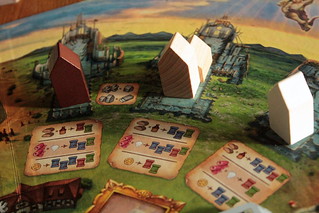
In bid order, players choose one of the four characters for this round: Pope, Emperor, Merchant or the Petty Sinner. Each has a privilege, three of them have a Foreplay to be done the moment you pick the character. The Pope may move one of the three Pope Stones between the three Dens of Sin. If all stones end up in the same den, then the players with markers in the other dens are punished for their sins and go to hell. The Emperor sends a building crew to one of the three cathedrals. Two building crews at the same cathedral build one part of the cathedral, if that part is the second part then the cathedral is completed and donations here are counted immediately. The Petty Sinner must immediately place two stones in the Den of Petty Sins – that’s one of the dens mention above for the Pope – but he may immediately visit the House of Pleasure without paying the price. The House of Pleasure is exactly what you think it is, and we’ll see what it does in a moment.
All Foreplay done, players then take turns to take actions, only one action per turn but they keep going until the round ends. A player can take two actions, but only if they turn their tally stick higher. Remember, hell awaits the player with the highest tally.
Actions are simple. One option is to buy one good (Bread, Wine, Cloth and Gems) from the market at a fixed price. Goods available are drawn randomly before each round. Sometimes you can also buy an Indulgence from the market. You can get two goods for the price of one, but then you must put one of your sin stones in the Den of Greed, you greedy bugger. The Merchant takes one stone from the market for free after each of his turns. That’s a pretty nice privilege, and since a round lasts until the market is empty it also ensures that the round will end. Sooner than you want it to, usually.
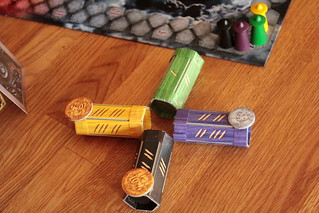
If you’re in need of money, you can also use an action to sell a good. Selling goods always fetches a higher price than you paid, but it does eat up an action. And since the good doesn’t go back to the market selling doesn’t extend the round, either. Option number three, you may donate one cube of goods or one coin to a cathedral. You must show your opponents what you’re donating, but not if you donate it to the first or second cathedral.
And finally, you may spend your turn going to the House of Pleasure. Doing that, you pick one of the six rooms and reap its benefit. For rooms one to four, that means taking the card there. Those cards have benefits that range from giving you money or coins to placing a building crew or even sending an opponent to hell. But all the cards have a price, to be paid by turning your tally stick up. Room number five lets you pick a card from the first four rooms without turning your tally stick, but you must place a sin stone in the Den of Lust. Room number six, finally, lets you purchase an elusive yellow Indulgence. I should probably have mention Indulgences come in four colors and are most valuable in full sets. Well, this is the only place to find a yellow one. You really won’t get far with a life of virtue. Live a little! Pay it off later!
Two characters have a privilege in the House of Pleasure. The Petty Sinner never has to turn their tally stick when he visits here. He is a Petty Sinner, it’s just in his nature. The Pope visits the House of Pleasure incognito. He secretly chooses which room to visit, then the other players guess where he is. If they miss him he gets the room’s bonus without paying the price. But if he’s caught his soul will immediately move a step closer to hell. A smart pope visits early, not when there’s only one room left.
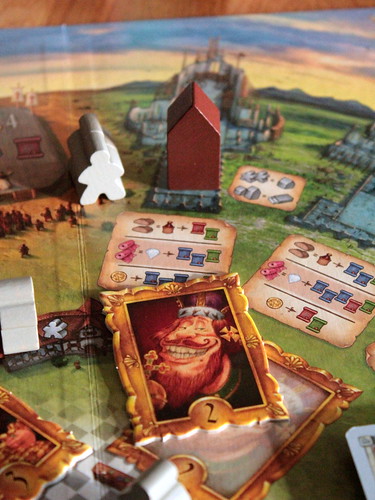
When all actions are taken it’s time to compare tally sticks. The player with the highest tally moves one step closer to hell for each notch of difference between his tally stick and the lowest stick for the round. With some bad planning and bad luck, he might move more, because each space on the highway to hell only holds one pawn. If you’d stop on an occupied space you move on to the next free one instead. But hey, going to hell is not all bad. All ties in Mea Culpa are decided in favor of the player closer to hell, so there’s that.
As mentioned above, all this goes on until the second cathedral is finished. And only until then, none of that modern “finish the round so all players have the same number of turns” nonsense. You only compare tally sticks once more, then you score points for your Indulgences. A set of all four colors moves your soul eight steps to heaven, a leftover Indulgence without a set still counts one point. Just hope you didn’t go to far to hell in your efforts to go to heaven.
Can we tell heaven from hell? The verdict
Mea Culpa is a bit of a tough game to get into. Not because the rules are terribly complex (they aren’t) but because it’s tough at first to figure out what to do. You have a clear objective, collect Indulgences, but how much sin can you risk to get them? How much is it really worth to pick your character first early in the game? And how hard will it be during the game to make money? I think it’s fair to say that our test players are used to getting into new games, but these questions were tough to find answers to before the actual first play. Although the rules are simple enough, you really don’t get a feeling for Mea Culpa before the second game. You should give it that before you call it “too random” or “uncontrollable”.
But there are some things you can’t control. Many things happen immediately, and that leaves you with some unpleasant edge cases. For instance, a round might end before the last player had a regular turn. I think that option is balanced because the last player is always the Petty Sinner, and he had a free visit to the House of Pleasure in his Foreplay. But it is rather upsetting when it happens to you. Similarly, a cathedral scoring or even the end of the game can sometimes catch you by surprise. Planning more than one round into the future is risky here.
All that is fun, though, once you get used to it. Things happen unexpectedly, but not out of pure randomness, that is rather refreshing. But there is one thing Mea Culpa doesn’t deal well with at all: warm body players. You know the type, players that will play to do you a favor, but really they’d rather have the game end quickly. The cathedral building/donation mechanism works great for players that want to play, but this type of player breaks it. When they just want the game to end, no one can play with any sort of strategy. If someone looks like they don’t really want to play, suggest something else.
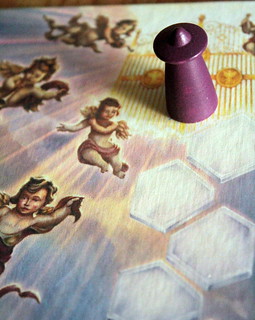
That problem aside, though, Mea Culpa is fun. I admit, I didn’t think so after the first game. See above. I started thinking so during the second game. It’s a a quirky game with some parts that look like they don’t go together, but then they do. Between auctions, hidden donations and cathedral building, there is a good amount of interaction here, as well as a good amount of strategy seasoned with a bit of randomness. Also, the tally sticks and donation boxes are a bit of a pain to build before your first game, but once built they are very sturdy and give the game a unique touch. And, being a professing cynic myself, I enjoy the theme of sinning in order to go to heaven a lot.
Is Mea Culpa a bit of gamers’ heaven? Well, maybe not quite. I really enjoy, but I can see how it won’t be for everyone. But it does sit comfortably in the upper reaches of purgatory, in plain view from the pearly gates.















